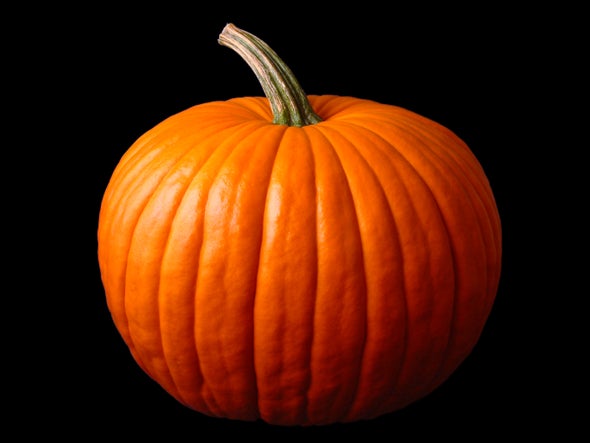(单词翻译:单击)
听力文本
This is Scientific American's 60-second Science, I'm Christopher Intagliata.
This Halloween, as you carve jack-o'-lanterns and make pumpkin pie, take a moment to appreciate just how far the humble pumpkin has come.
"The wild form of a pumpkin is about the size of a tennis ball, and it tastes like one. It's incredibly bitter, it's got a very hard rind, and it's extremely unpalatable to humans."
Logan Kistler, an archaeologist at the Smithsonian's National Museum of Natural History. He says as unpalatable as those early squashes were, they made a tasty tidbit for mastodons.
"And we know that because there are deposits of mastodon dung in Florida that are over 30,000 years old. And so in those mastodon dung deposits, sure enough, what we can find are wild squash seeds."
Kistler says mastodons probably weren't put off by the gourds' bitter taste. Because a few years back, his team analyzed the genomes of more than 40 mammals. And they found that the larger the animal, the fewer copies of a bitter-taste-perception gene they tended to have.
"And turns out there's this absolutely beautiful correlation between body size and the ability to taste bitter compounds. And so what we think is going on is that these are really plants adapted for a landscape with large herbivores. They evolved this bitter toxicity in order to deter small mammals who would destroy the seeds, but they've evolved it at just the right level where large mammals are not put off by the bitterness, and they can disperse the seeds."
Through their poop.

Kistler reported those findings in the Proceedings of the National Academy of Sciences in 2015.
Along with dispersing seeds, mastodons, just like modern elephants, probably stomped around a lot and vacuumed up vegetation—creating the sort of disturbed environments where squash plants thrive. So it was a beneficial match.
But then, of course, the mastodons died out. And humans, Kistler says—which also tend to disturb the environments around them, creating great squash habitat—may have taken the mastodon's place. The details are murky.
"The way that the domestication of squashes started is still a little bit of a mystery, because they're bitter and toxic in the wild, and they get to this place of palatability."
Perhaps, he says, humans grew the gourds first to use them as storage vessels—and later tamed the bitterness. Either way, squash seeds, stems and rinds discovered in a cave in Oaxaca, Mexico, provide evidence that, at least 10,000 years ago, ancient people had already begun domesticating a squash that would, eventually, carve a place for itself as our modern pumpkin.
Thanks for listening for Scientific American's 60-second Science. I'm Christopher Intagliata.
参考译文
这里是科学美国人——60秒科学系列,我是克里斯托弗·因塔格里塔。
在今年万圣节,当你雕刻南瓜灯和做南瓜饼时,花点时间来欣赏一下这个不起眼的南瓜已经走了多远。
“野生南瓜的大小和网球差不多,尝起来也像。它非常苦,外皮非常硬,对人类来说非常难吃。”
史密森尼国家自然历史博物馆的考古学家洛根·基斯特勒说到。他说,尽管早期的南瓜很难吃,但它们对乳齿象来说是美味佳肴。
“我们知道这些是因为佛罗里达州有3万多年前的乳齿象粪便。所以在那些乳齿象的粪便和沉积物中,我们肯定能找到野生南瓜种子。”
基斯特勒表示,乳齿象可能不会被野生南瓜的苦味吓退。因为几年前,他的团队分析了40多种哺乳动物的基因组。他们发现,哺乳动物的体型越大,其感知苦味的基因就越少。
“事实证明,体型和品尝苦味化合物的能力之间存在绝对美妙的关联。所以我们认为,这些是适应大型食草动物生存环境的植物。它们进化出这种苦味毒性是为了阻止小型哺乳动物破坏种子,但它们进化的程度恰到好处,大型哺乳动物不会被这种苦涩所吓退,它们可以散播种子。”
通过它们的粪便。
基斯特勒在2015年的《美国国家科学院院刊》上报告了这些发现。
除了散播种子,乳齿象和现代大象一样,可能会四处踩踏并吸收植物——创造出一种混乱的环境,让南瓜植物茁壮成长。所以这是一场有益的比赛。
当然,后来乳齿象灭绝了。基斯特勒说,人们也倾向于扰乱它们周围的环境,创造出巨大的南瓜产地——可能取代了乳齿象的位置。但具体情况尚不清楚。
“南瓜育种的起源至今仍是个谜,因为它们在野外又苦又毒,所以来到了这个美味的地方。”
他说,也许人类最初种植南瓜是为了将其用作储藏容器,后来才让苦味变淡。不管怎样,在墨西哥瓦哈卡某洞穴中发现的南瓜种子、茎部和皮提供了证据,证明古人至少在1万年前就开始种植南瓜,这种南瓜最终会为自已开辟一块地方,成为我们现在的南瓜。
谢谢大家收听科学美国人——60秒科学。我是克里斯托弗·因塔利亚塔。
译文为可可英语翻译,未经授权请勿转载!
重点讲解
重点讲解:
1. sure enough 果真,果然(尤用在讲故事时);
We found the English treacle pudding too good to resist. Sure enough, it was delicious.
我们觉得英国糖蜜布丁太好吃了,令人无法抗拒。的确非常美味。
2. put off 使反感;使对…失去兴趣;
The high divorce figures don't seem to be putting people off marriage.
离婚的人很多,但这好像并没有打消人们对结婚的热情。
3. die out 逐渐消亡;灭绝;绝种;
How did the dinosaurs die out?
恐龙是如何灭绝的?
4. either way (两种情况中)不论发生哪一种情况;
The sea may rise or the land may fall; either way the sand dunes will be gone in a short time.
可能会出现海平面上升或陆地下沉:不论发生哪种情况,沙丘都会在短时间内消失。


